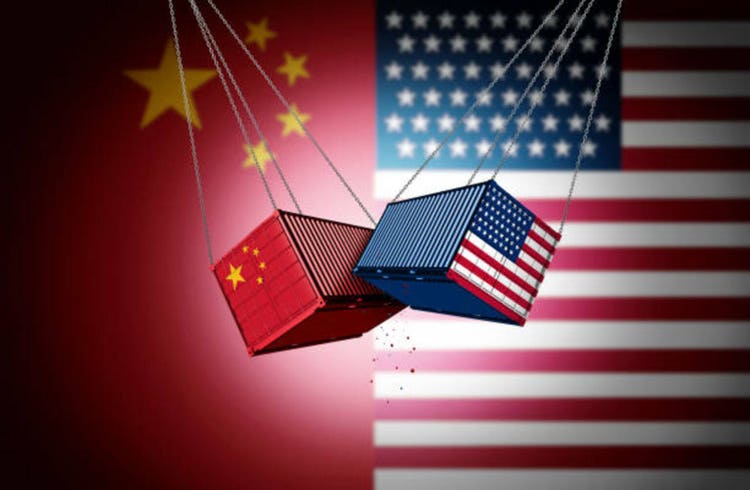Business
Trump Threatens Trade War Escalation Over Cooking Oil Imports

U.S. President Donald Trump has signaled a potential escalation in the ongoing trade tensions with China, suggesting that his administration may impose restrictions on cooking oil imports. This statement, made via social media on September 26, 2023, follows China’s recent decision to halt purchases of U.S. soybeans, raising concerns over the implications for American agricultural exports.
In his online post, Trump accused China of deliberately avoiding U.S. soybean purchases, which has significant ramifications for American farmers and the agricultural sector. The President emphasized that if China continues its current course, the U.S. might respond by restricting imports of cooking oil, a move that could further strain trade relations.
The backdrop to this situation is a broader trade dispute that has been ongoing for several years. China has been a major importer of U.S. agricultural products, but recent actions have disrupted this relationship. The halt on soybean purchases is particularly alarming, as it could lead to substantial financial losses for American farmers who rely heavily on exports.
Impact on U.S. Agriculture and Trade Relations
The potential import cuts on cooking oil could have a direct impact on U.S. businesses involved in the agricultural supply chain. The cooking oil market is significant, with the U.S. exporting millions of dollars’ worth of products each year. Any restrictions could result in increased prices domestically and a loss of competitive edge in international markets.
According to industry analysts, the fallout from these trade tensions could lead to a significant shift in agricultural exports. The U.S. Department of Agriculture reported that in 2022, the U.S. exported approximately $29 billion worth of soybeans to China. A continuation of China’s purchasing freeze could jeopardize these revenues, making it critical for U.S. policymakers to address the situation swiftly.
Trump’s remarks indicate a willingness to negotiate aggressively, but this approach may complicate efforts to restore stability in trade relations. The ongoing trade war has already led to increased tariffs on various goods, affecting not only farmers but also consumers who may see higher prices at the grocery store.
Future Considerations for Trade Policy
As the situation develops, stakeholders in both countries are closely monitoring the implications of Trump’s threats. Experts suggest that the U.S. administration must weigh the potential benefits of retaliatory measures against the risks of further alienating key trading partners.
While some advocate for a hardline stance, others argue for a more diplomatic approach to resolve the trade dispute. As negotiations continue, the impact on agricultural markets and broader economic relations will be at the forefront of discussions.
The evolving landscape of U.S.-China trade relations will require careful navigation to ensure that both countries can find common ground. The outcome of these tensions will not only affect specific industries but also the global market dynamics as a whole. With the stakes high, the international community watches closely as both nations prepare for what could be a turbulent period ahead.
-

 Science4 months ago
Science4 months agoToyoake City Proposes Daily Two-Hour Smartphone Use Limit
-

 Top Stories4 months ago
Top Stories4 months agoPedestrian Fatally Injured in Esquimalt Collision on August 14
-

 Health4 months ago
Health4 months agoB.C. Review Reveals Urgent Need for Rare-Disease Drug Reforms
-

 Technology4 months ago
Technology4 months agoDark Adventure Game “Bye Sweet Carole” Set for October Release
-

 World4 months ago
World4 months agoJimmy Lai’s Defense Challenges Charges Under National Security Law
-

 Lifestyle4 months ago
Lifestyle4 months agoVictoria’s Pop-Up Shop Shines Light on B.C.’s Wolf Cull
-

 Technology4 months ago
Technology4 months agoKonami Revives Iconic Metal Gear Solid Delta Ahead of Release
-

 Technology4 months ago
Technology4 months agoApple Expands Self-Service Repair Program to Canada
-

 Technology4 months ago
Technology4 months agoSnapmaker U1 Color 3D Printer Redefines Speed and Sustainability
-

 Technology4 months ago
Technology4 months agoAION Folding Knife: Redefining EDC Design with Premium Materials
-

 Technology4 months ago
Technology4 months agoSolve Today’s Wordle Challenge: Hints and Answer for August 19
-

 Business4 months ago
Business4 months agoGordon Murray Automotive Unveils S1 LM and Le Mans GTR at Monterey









